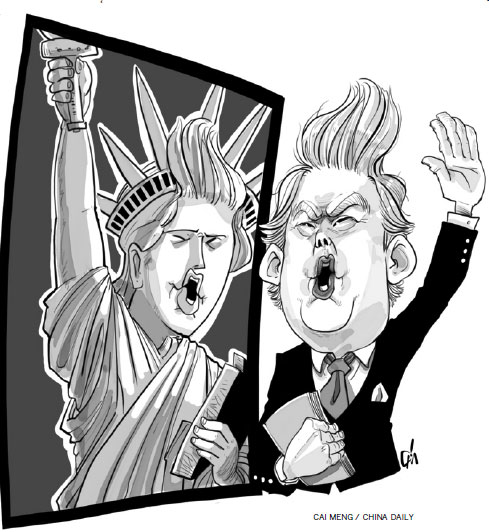Trump best mirrors US domestic politics
Updated: 2016-01-07 08:28
By Sun Chenghao(China Daily USA)
|
||||||||
Donald Trump has been hitting the headlines almost every day for his absurd and inflammatory comments. To the surprise or chagrin of many people, the billionaire running for the Republican presidential nomination has dominated the Republican race since July.
According to a CNN/ORC poll released on Dec 23, 2015, Trump led the race by 39 percent support with Ted Cruz (18.6 percent) and Marco Rubio (11.6 percent) following him. The other Republican candidates are yet to figure out how to shake off Trump's lead.
Political observers, however, don't consider Trump a "reliable" candidate; they believe he may soon fall behind in the presidential nomination race because of his careless and ridiculous remarks, for example, on immigrants and Muslims.

Still, people are wondering how a person like Trump could dominate the Republican field into 2016.
The "Trump phenomenon", no matter how absurd it is, reflects certain basic changes and trends in US domestic politics. The phenomenon is essentially based on popular contempt for political hypocrisy in the US, as opposed to a person's capability to formulate policies or even govern the country. It seems Republican voters want to change Washington's political model and expect a so-called outsider to overturn the traditional pattern of politics, as most of them appear tired of the polarization in and dysfunction of the government and Congress.
Among the voters who don't believe traditional politicians can put the US back on track and thus support Trump, white blue-collar workers comprise the most consolidated support group. In fact, the group has become an important component of the Republican votebank. According to a PRRI-Brookings survey, conducted by Public Religion Research Institute in partnership with the Brookings Institution, 55 percent of Trump's supporters are white and working class while the demographic most likely to back him comprises men aged between 50 and 64 with no more than a high-school education and worries about job security because of competition from immigrants.
Over the past seven years, the US has seen many struggles between the Democrats and Republicans - the US government shut down in October 2013 and the US approval of Congress remains low (at a rate of less than 20 percent). Therefore, for many, Trump is a welcome change. Unlike traditional candidates, Trump, a billionaire with a big mouth and little respect for political taboos, has solicited the support of many ordinary people.
Another serious problem with the US society is that some voters have lost faith in the "Washington brand" of politics. What Trump has offered - for example, the slogan "make America great again" - is even hollower than "hope and change" proposed by US President Barack Obama more than eight years ago.
That so many people support Trump's slogan reflects people's distrust of and dissatisfaction with the existing political system, the government and politicians. For instance, on foreign policy, US citizens seem to think the Obama administration responds slowly and softly to potential threats. That's why after the California shooting in December, when Trump called for a total ban on Muslims' entry into the US, he got his highest public rating in a national poll.
On the economic front, Obama could get a relatively high score, but economic growth has yielded little tangible fruits for ordinary people. On social issues, as racial conflicts and shootings increase and become more serious, US citizens feel more insecure and yearn for a "tough guy" who can take determined measures.
Although it is too early to say whether Trump will win the Republican nomination race, one thing is certain: his domination by exploiting public sentiments will have a huge impact on the Republican Party by possibly attracting new voters to the party and reflecting new developments in US domestic politics. In this regard, whether he wins or loses will be less important than the effect of his candidature on US political life.
The author is an assistant research fellow, Institute of American Studies at China Institutes of Contemporary International Relations.
(China Daily USA 01/07/2016 page12)
- Obama says US must act on gun violence, defends new gun control rules
- Over 1 million refugees have fled to Europe by sea in 2015: UN
- Turbulence injures multiple Air Canada passengers, diverts flight
- NASA releases stunning images of our planet from space station
- US-led air strikes kill IS leaders linked to Paris attacks
- DPRK senior party official Kim Yang Gon killed in car accident

 What's in store at CES 2016
What's in store at CES 2016
 Li springs a surprise on coal mine visit
Li springs a surprise on coal mine visit
 Man proposes to his beloved with a $23,010 ghost castle
Man proposes to his beloved with a $23,010 ghost castle
 New Year's wishes from Chinese expatriates
New Year's wishes from Chinese expatriates
 Xi begins new year with visit to Chongqing
Xi begins new year with visit to Chongqing
 Top 10 events that moves the stocks
Top 10 events that moves the stocks
 Top 10 travel spots around Hainan
Top 10 travel spots around Hainan
 Highlights of second stage of Darkar Rally 2016
Highlights of second stage of Darkar Rally 2016
Most Viewed
Editor's Picks

|

|

|

|

|

|
Today's Top News
Shooting rampage at US social services agency leaves 14 dead
Chinese bargain hunters are changing the retail game
Chinese president arrives in Turkey for G20 summit
Islamic State claims responsibility for Paris attacks
Obama, Netanyahu at White House seek to mend US-Israel ties
China, not Canada, is top US trade partner
Tu first Chinese to win Nobel Prize in Medicine
Huntsman says Sino-US relationship needs common goals
US Weekly

|

|